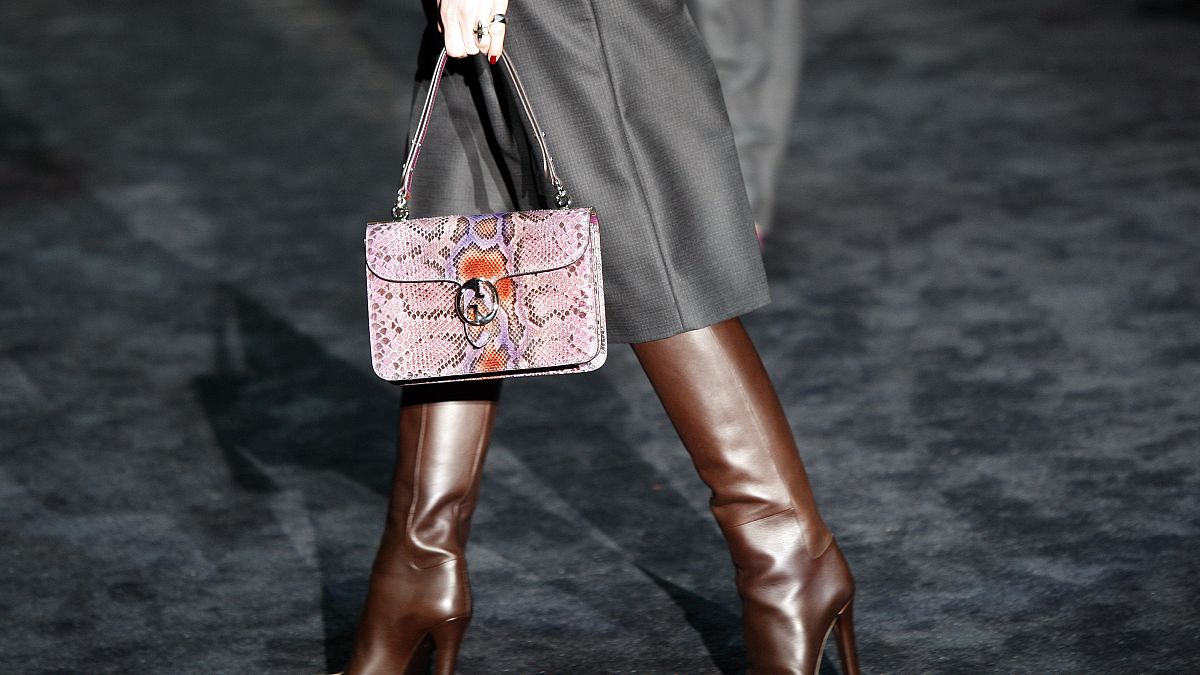Under the luxury ban, wealthy Russians won't be able to buy EU-made products worth over €300, such as bags, shoes and caviar.
The European Union has expanded its already-long list of sanctions against Russia to heavily restrict the export of EU-made luxury goods towards the oil-rich country.
The luxury ban targets a vast catalogue of products worth over €300 that includes, among other articles, clothing, footwear, leather, fashion accessories, pearls, jewellery, gold, silversmith, diamonds, suitcases, handbags, purses, wallets, wigs, skincare, perfumes, as well as works of art, antiques, cutlery, porcelain, china and fine pottery.
Caviar, truffles, champagne, wine, vermouth and cigars over €300 are also being banned.
Vehicles worth over €50,000 -- a range often exceeded by the most sophisticated models from brands like Mercedes, Ferrari and Porsche -- and musical instruments that exceed €1,500 fall equally under the ban.
In practice, this means all the targeted EU-made products can no longer enter the Russian market.
Europe's high-end industry is renowned around the world and accounts for over 10% of EU exports, according to the European Commission. With an estimated value of €800 billion, the sector is heavily export-oriented and sells more than 60% of its production outside the bloc.
The luxury ban was first teased by EU Commission President Ursula von der Leyen at the end of a two-day informal summit in Versailles, calling it a "direct blow to the Russian elite".
"Those who sustain Putin's war machine should no longer be able to enjoy their lavish lifestyle while bombs fall on innocent people in Ukraine," von der Leyen said on Friday.
Energy, steel and credit ratings
The new sanctions also introduce a prohibition to conduct new investments in Russia's energy sector and to transfer EU-made equipment and technology used for energy exploration, but there's an exemption for nuclear energy and refined fossil fuels, like gas and oil.
Russian steel imports worth over €3.3 billion are banned from the bloc and Russian companies are barred from hiring EU credit rating agencies.
Over a dozen of oligarchs and "propagandists" believed to have a "close relation" and enjoy "privileged access" to President Vladimir Putin, such as former Chelsea owner Roman Abramovich, have been slapped with travel bans and asset freeze.
Other names are German Borisovich and Alexey Viktorovich, shareholders of the Alfa Group, a large investment conglomerate; Armen Sumbatovich, member of the Russian Today board; and Konstantin Ernst, CEO of the state-controlled Channel One.
This brings to 893 the total number of blacklisted individuals.
Additionally, the 27 have agreed to deprive Russia of the most-favoured nation status.
Under the rules of the World Trade Organization (WTO), all members grant each other this particular status, which lowers tariffs, removes trade barriers and prevents discriminatory treatment.
The bloc has invoked a national security exception to bypass the WTO provision and is now able to impose higher tariffs on Russian goods headed to the EU single market.
The Russian Federation became a WTO member in 2012 following 18 years of negotiation.
The most sanctioned country in the world
The latest raft of sanctions were approved by EU ambassadors on Monday evening and will enter into force after their publication in the EU's official journal.
The announcement comes as Moscow troops continue bombarding Ukrainian cities while officials engage in talks to end the weeks-long violence.
The EU began imposing sanctions on Russia after the recognition of the two breakaway provinces in the Donbas region, an episode seen as a prelude to the war.
The list was further expanded after the Kremlin launched the all-out invasion of Ukraine and has progressively been enlarged. It now targets everything from the Russian Central Bank to state-owned TV channels, semiconductors and aircraft components.
The latest round also puts forward measures to prevent Russian companies and individuals from resorting to cryptocurrency in a bid to circumvent the sanctions.
The penalties are designed in coordination with G7 and Western allies but they are not exactly equivalent.
The bloc's prime goal is to cripple Moscow's military apparatus by going after its main sources of financing, even though one of Russia's most profitable exports -- natural gas -- has been so far spared from retaliation.
"Let's also be honest. Putin is not going to be impressed that Russian upper class cannot buy Italian handbags anymore .That's not going to change the course of the war," Guntram Wolff, director of the Bruegel think tank, told Euronews.
"What will impress him is if the West manages to effectively stop revenues from oil and gas."
Russia is now the most sanctioned nation in the world, having amassed over 5,000 different types of penalties, according to the Castellum.AI database.
Putin's regime has surpassed the numbers of Iran, Syria and North Korea in less than one month.
